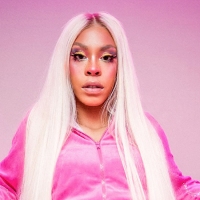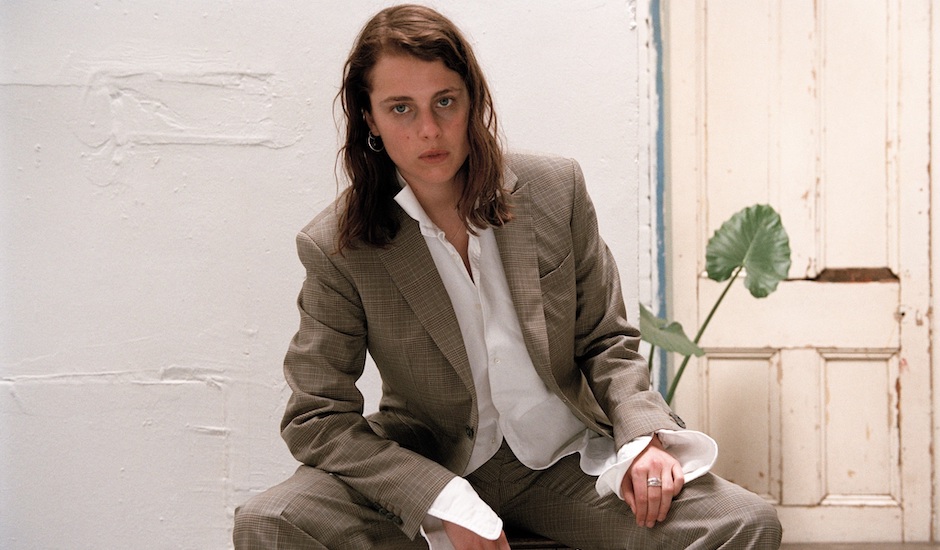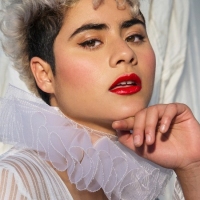 Rico Nasty is a Spongebob in a sea of SquidwardsShe’s energised and unapologetic, but also a massive Spongebob Squarepants fan. Rico Nasty is unlike anyone else in rap.
Rico Nasty is a Spongebob in a sea of SquidwardsShe’s energised and unapologetic, but also a massive Spongebob Squarepants fan. Rico Nasty is unlike anyone else in rap.

Filthy, Fun & Ferocious: Reclaiming Power with Marika Hackman
The English musician's third album, Any Human Friend, is out now via AMF Records / Caroline Australia.
Header image by Joost Vandebrug.
In 2019, musicians are reclaiming power. Inspired by Chance The Rapper and Frank Ocean, many rising artists are neglecting the traditional label-driven release structure in favour of independence and accompanying creative freedom, while other musicians locked into contractual label deals are seeking this independence through label-less aliases and collaborative projects. Politically, however, a whole other sense of reclamation is occurring.
Largely influenced by the right-wing movements in western governments - America, under Trump; England, under Boris Johnson and undergoing Brexit; Australia, who recently re-elected Scott Morrison - political music feels just as prevalent today as it was in its peak and no longer is the result of hyper-political musicians like M.I.A. and Pussy Riot. Hell, even Taylor Swift - once called the "Aryan Goddess" and labelled somewhat of a right-wing superhero due to her glaring political silence in the 2016 US Election - is now campaigning for gun reform group March Of Our Lives and calling out the White House on the televised, VMAs stage. Elsewhere, other musicians - female, often - are biting back to prevalent bigotry that even at the start of this decade would cause musicians outside of that white, heterosexual male bracket to feel hopeless and unwelcomed, giving power to the acts that have often had to fight their whole careers for respect - and it's an incredible thing to watch.
English musician Marika Hackman is someone who has been at the forefront of this shifting power struggle. After her debut album We Slept At Last paired subtle indie-rock with this shimmering sense of unsettlement, her second - 2017's I'm Not Your Man - felt like an introduction to this new and empowered version of Marika as a musician, navigating sexuality and female relationships amongst hook-y dream-pop and emotively bold vocal cries; breaking herself out of this 'delicate indie-pop' box that many unfairly placed Marika inside after the success of We Slept At Last. On Boyfriend for example, I'm Not Your Man's album-summarising and blistering opener, Hackman sings "It's fine 'cause I am just a girl / It doesn't count / He knows a woman needs a man / To make her shout", breaking down the often-unsung and often-unwelcomed accompaniments of female queerness like, in Boyfriend's example, being "interrupted mid-snog by some seedy wanker asking to join in."
Her third album, however - Any Human Friend - is an entirely different force. It takes the bluntness of Boyfriend and amplifies it across 11 tracks of explicative-filled indie-rock-pop, taking the male gaze of things like sex and female queerness to twist it into something seen through the lens of Marika herself, incorporating experiences and truths to bring honesty to these topics. On All Night, she describes sex through 'fucks' and moans; a far cry from the "fucking bitches" - as she says it - objectification of sex often found in the male gaze ("You didn't even speak, you just took my hand / And held it between your thighs," she sings). Hand Solo, an almost-four-minute pace of guitar rhythms and her aching vocal, tackles masturbation with the same genuineness and relatability, with Marika's sharp tongue and playful lyricism highlighted through abstract nods to old wives and lyrics such as her favourite: "Under patriarchal law, I’m going to die a virgin."
"This idea that you haven’t lost your virginity unless you have sex with a guy… how do you define having sex?" On Hand Solo, she even questions sex in its literal sense. "What actually is sex? A line like that is definitely political. There, I know exactly what I’m doing… I think we need more wank anthems, especially for women." Blow and Conventional Ride are two other tracks on Any Human Friend that feel bold in their questioning and authenticity, but as she explains in the album's lead-up, the whole record is built to expose; expose herself, and expose the greater world and the systems built around it. "This whole record is me diving into myself and peeling back the skin further and further, exposing myself in quite a big way. It can be quite sexual," she explains. "It’s blunt, but not offensive. It’s mischievous."
We Slept At Last is this subtle-sweet indie-folk, but on I’m Not Your Man, it felt - and sounded like - you were going through quite a powerful moment. Just look at Boyfriend for example, and that now-famous line “It’s just a dream / A woman really needs a man to make her scream.” Any Human Friend feels like a further extension on this, and you’ve called it quite a sexually-powerful album. Did it feel like the natural next step after introducing it with I’m Not Your Man?
Yeah, it felt like that I became really bold with I'm Not Your Man and that definitely increased my confidence in that sense, and I really enjoyed doing that. With this album, I wanted to push that further and be as honest and direct as possible.
In a way though, this album is quite similar to the first. I wanted to bring some elements of the first album - like production techniques, for example - to create this more polished sound and translate that fun, raucous energy into something that would be powerful or hold power without taking away from this crystal clear production.
When it comes to trying to continue that power and boldness that must put you in a pretty powerful position when it comes to writing an album and starting that clean slate again.
Yeah, 100%. It's a difficult thing to do - trying to get a point across in as little words as possible. There are topics on this album that I could write about forever, but you have to keep it simple and be effective. It was a lot of fun though, exploring that side. I really enjoyed writing the lyrics to this record. It was remarkably empowering and I felt like... it was within my grasp coming off the back of I'm Not Your Man. You feel brave writing an album like this because you're being so open.
This is obviously a very empowering album to make, but is there a sense of vulnerability with being so open on a record like this?
There's definitely a sense of vulnerability, but I guess that's why you feel so brave and empowered doing it. I think that vulnerability is something that connects with people. It's relatable, and for an album to stick with someone, I feel like you have to enter their world and think about them and their lives. I think people just want to hear about other experiences that can relate to, and I guess being out there and saying stuff like this is the most empowering thing you can do. You can't take any of this back, you know? You're sharing these experiences and you're owning them.
Does it feel more empowering to put out this album compared to the last two?
It feels more empowering, but I definitely haven't realised that as much as since I've been talking about it and doing press. I've really come to enjoy talking about this record and that's something that's solidified what this album means to me and how it makes me feel.
Like I was saying before, I feel like because of my honesty on this record, I have a really strong connection to it. When I was starting out, I found it a lot harder to talk about my work because I never quite understood what it meant to me and what conclusions I was drawing. Now, I feel quite bold and empowered talking about what I've done, and because it connects with me so well, it means quite a lot to me.
Is there a sense of hesitancy in putting out a record like this? Or is it quite a cathartic process?
There must be, but it's quite hard to say. A lot of the times it feels a bit almost-damaging because you're digging down into yourself and you can feel a bit attached - if that's the right word - to what you're discussing in your music, especially as it's such a solitary process. I think that catharticism happens when it's released and you start to hear people's opinions about the album and the story you're telling. It's so empowering to put a record out, and then to have people contact you with their experiences too, and how you may have helped them in a certain way.
That's kind of why I made this record. I forgot how incredible it is to have other people sharing their experiences and their trauma and tell me how they connect or find comfort or find power in a record like this.

Being a woman in music, you often have sexuality placed upon you by objectification and sexism, those shitty social media comments, you know. This album, however, feels like you're defining this for yourself.
I don't come into a record knowing exactly what I want to write about. Instead, you've got to sort of allow that ship to steer itself for a bit until it becomes more clear what you're tackling lyrically-wise. It became really apparent to me that when I was writing songs, it became so personal to me and that just became almost-hypnotic.
This album really came out of my own perspective and my own experiences, and it's something that I think a lot of people need to hear or talk about. This empowerment and defining this sexuality for yourself is something I really care about and a voice I recognise, and it's a voice that I think needs to come from someone like me - or, just not a man. No-one else can pin their ideas on me, or tell me what my own perspective and experiences are.
By the end of the album, that really set into the inspiration of finishing things off and doing the artwork, and foreshadowing all these press questions and whether I'd answer things this way or that way. For the artwork, I really wanted to show a woman's body just... how it is. Or, in other words, I wanted to show what a women's body looks like through my perspective - which is my body itself. No touching up. No airbrushing. No tucking in this here or covering that there. That's not my body, and we all have them. Bare all of those... imperfections, I guess people call them... and that'll make the world a more inclusive place.
That's something you do really well on the album. It ties in nicely as well to your perception of sex on the record. Sex in music is almost always from the male perspective, and it's always this hyper-sensual experience which leaves out all the truth of what sex can actually be; whereas an album like this talks about sex for what it is - the bad bits of sex, the "gross" bits of sex. Things like that.
Yeah, 100%. Sexual experiences are different for everyone. There's different amounts of passion and lust involved, and there's also things that aren't passion - there's also some bad bits of sex which happens! Often you can feel objectified or shamed if sex isn't this perfect thing that it's made out to be in some music or pop-culture. Who decided what sex is? Who decided what sex looks like or feels like or even smells like?
Sex means different things for different people, and sex is a different thing for different people. Sexual identity is very much a thing and something that varies from person to person. I just wanted to take ownership and be like hey, these are my experiences with sex. It might be different to everything else you hear all the time, but I know there are other people out there - the majority, even - whose sex is different to what you hear in this or that. I wanted to give those people some power.
On All Night, you talk about the fetishisation of female sex in a way that feels more authentic and genuine on the woman's behalf, which I guess comes with you writing from your own experiences. "You didn't even speak, you just took my hand / And held it between your thighs," is an incredible line where you do that.
I think it comes down to that thing where if I am being open, I'm not letting anyone else define it for me. This is from my brain and my mouth and it's my truth. I wasn't really thinking so much about the theme when I was writing the song - I was trying to find something and make it flow - but then when I sat back and looked at it, I was thinking about all the time I've heard songs about fucking bitches, and how it does it in a bit of a derogatory way. Whereas really, it's a bit of a celebration. It's about a completely mutual experience - a mutual sexual experience - and it's filthy and it's fun and I wanted to reclaim that 'fucking bitches' side of sex in music and empower myself through it.
This fetishisation of female queerness is something a lot of musicians in this space are biting back on… look at Christine and the Queens and St Vincent, for example, who are two of the most vocal through their music. Is there anything you draw from artists like these which have encouraged how direct your work is now?
I think it's definitely something I'm noticing around me that is incredibly refreshing, but it's not something I've explicitly looked for. When I write or when I'm meant to be writing, I become incredibly introverted and shut myself off from the world - including music. But I am definitely feeling that shift, particularly within popular music and bigger musicians. It feels like more commercial names - women, mostly - are willing to talk about their experiences and share their stories as they've realised it's not something that has to define their music, but simply complements it or lifts it to the next level.
What do you want people to take away from this record?
I want people to feel like they have a sense of belonging in a way they haven't before. I want this to be an album that shares my experiences, but also allows others to share theirs - especially if they haven't been able to before. I want to offer a safe space to experience everything about being a human - both the good bits and the bad. Life isn't this shiny Instagram world, it's a place where people fuck up and hey, it's a place where people can even say the word fuck. Life is a rollercoaster, as cliche as that saying is, and I wanted people to walk away being able to find comfort and relatability in both the highs and the lows of this rollercoaster.
Marika Hackman's new album, Any Human Friend, is out now via AMF Records / Caroline Australia.
Follow Marika Hackman: FACEBOOK
 Rico Nasty is a Spongebob in a sea of SquidwardsShe’s energised and unapologetic, but also a massive Spongebob Squarepants fan. Rico Nasty is unlike anyone else in rap.
Rico Nasty is a Spongebob in a sea of SquidwardsShe’s energised and unapologetic, but also a massive Spongebob Squarepants fan. Rico Nasty is unlike anyone else in rap.
 Accepting Flaws & Finding Therapy: Inside Montaigne's ComplexOn her new album, Montaigne navigates the complexities of growing up - something she's done a lot of since Glorious Heights.
Accepting Flaws & Finding Therapy: Inside Montaigne's ComplexOn her new album, Montaigne navigates the complexities of growing up - something she's done a lot of since Glorious Heights.